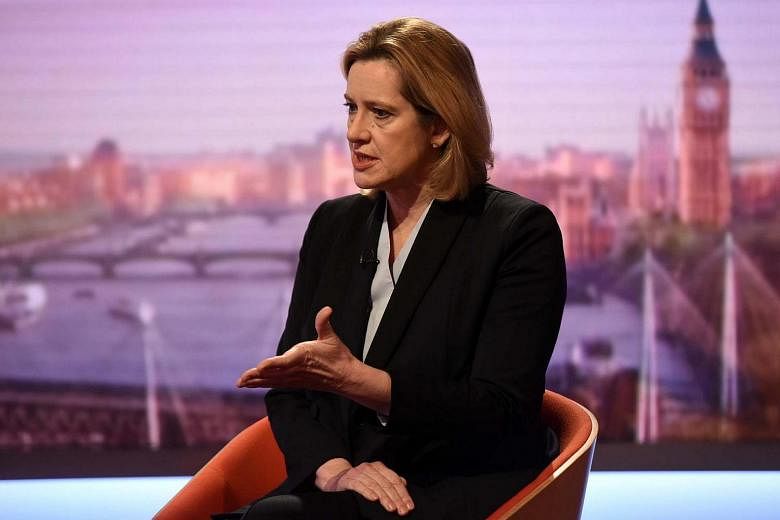LONDON • Technology firms must cooperate more with law enforcement agencies and should stop offering a "secret place for terrorists to communicate" using encrypted messages, British Home Secretary Amber Rudd said yesterday.
Local media reported that British-born Khalid Masood sent an encrypted message moments before killing four people last week by ploughing his car into pedestrians and fatally stabbing a policeman as he tried to get into Parliament in an 82-second attack that struck terror in the heart of London.
There may be difficulties in taking on technology companies. In the United States, officials have been trying to make them provide a way around encryption and talks have intensified since a mass shooting in San Bernardino.
But while saying she was "calling time on terrorists using social media as their platform", Ms Rudd also appealed for cooperation from the owners of encrypted messaging apps such as Facebook's WhatsApp, backing away from seeking to introduce new legislation.
Asked for her view on companies which offer end-to-end encrypted messages, she added: "It is completely unacceptable, there should be no place for terrorists to hide. We need to make sure organisations like WhatsApp, and there are plenty of others like that, don't provide a secret place for terrorists to communicate with each other."
"We need to make sure that our intelligence services have the ability to get into situations like encrypted WhatsApp."
The attack last Wednesday looks set to reignite the privacy-versus- secrecy debate in Europe, especially after warnings from security officials that Western countries will be increasingly targeted as Islamic State in Iraq and Syria (ISIS) loses ground in the Middle East.
Ms Rudd, appointed Home Secretary shortly after Britain voted to leave the EU, said the British case was different when asked about Apple's opposition to helping the FBI break into an iPhone from one of the San Bernardino shooters.
"We're not saying open up, we don't want to go into the cloud, we don't want to do all sorts of things like that," she said. "But we do want them to recognise that they have a responsibility to engage with government, to engage with law enforcement agencies when there is a terrorist situation."
She wants to see an industry-wide board set up in Britain to allow technology companies to better police their sites and stop "their sites, their platforms, their publishing enterprises... being used by terrorists".
Writing in the Sunday Telegraph, Ms Rudd said the Internet is "serving as a conduit, inciting and inspiring violence, and spreading extremist ideology".
Foreign Secretary Boris Johnson told the Sunday Times that "they need to stop just making money out of prurient violent material".
Ms Rudd said she has asked executives from the Internet companies to a meeting this week. "They're going to get a lot more than a ticking off," she added.
British police have released a man arrested for the terror assault on Parliament, leaving just one suspect in custody.
A total of 11 people were held on suspicion of preparation of terrorist attacks in the wake of Wednesday's rampage at Westminster.
Only a 58-year-old man arrested on Thursday in Birmingham, the central English city where the assailant lived, remained in custody on Saturday.
REUTERS, BLOOMBERG, AGENCE FRANCE-PRESSE

